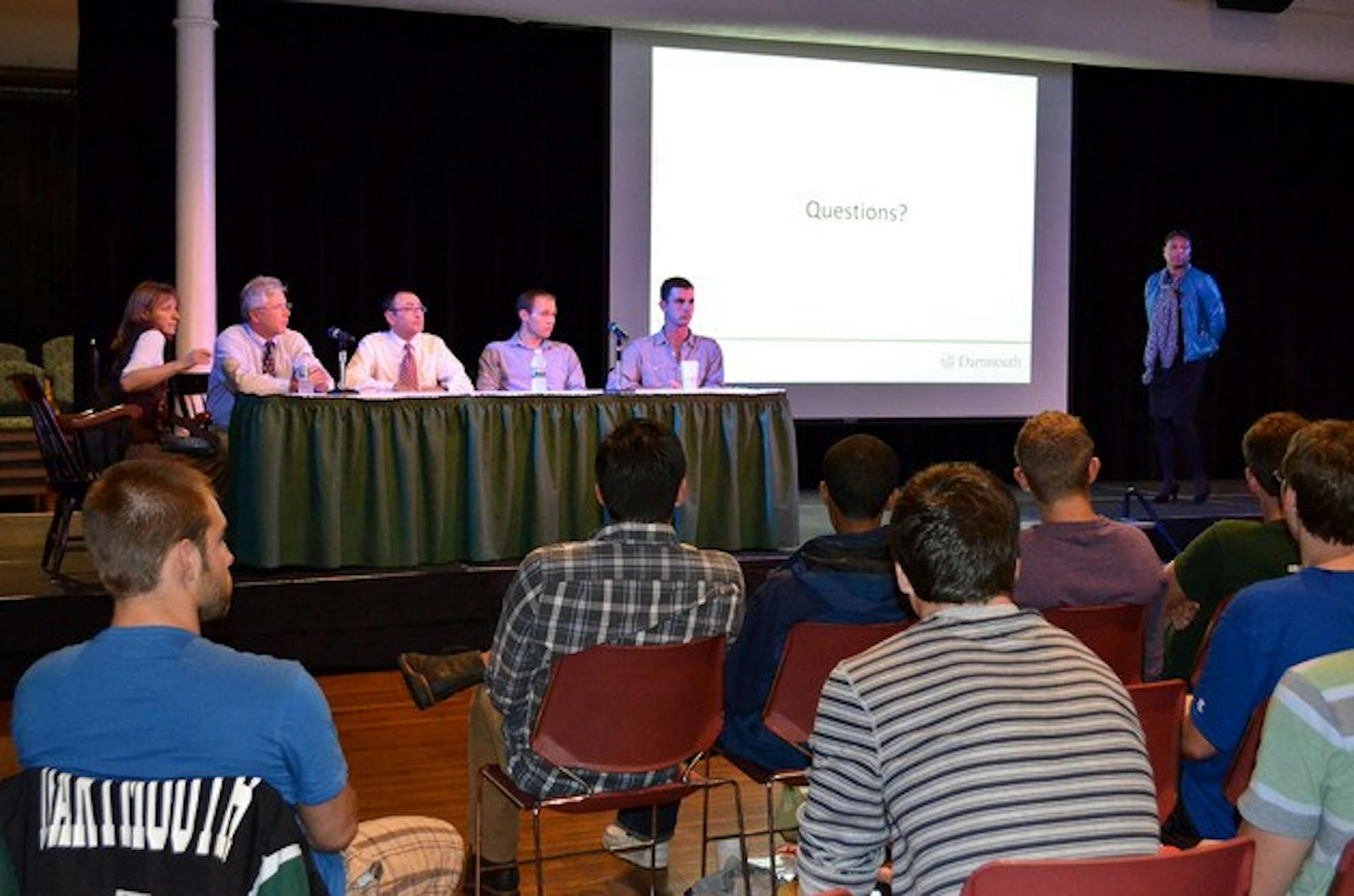The new policies will take effect this Friday, and increased sanctions on organizations in violation of the policies will be enacted after a 30-day grace period that ends on Oct. 22. Organizations that violate the policies will be subject to three terms of social probation and the loss of privileges including new member recruitment, competition and travel, depending on the nature of the organization. The exact punishment will remain under the jurisdiction of the Committee on Standards and is subject to change based on individual circumstances, Johnson said at the forum.
The event's panel included Greek Letter Organizations and Societies Director Wes Schaub, Director of Safety and Security and College Proctor Harry Kinne, Committee on Standards Chair and Dean of the College for Campus Life Kate Burke, Sigma Alpha Epsilon fraternity social chair and new member educator Cole Adams '13 and Greek Leadership Council moderator Duncan Hall '13.
Johnson said that the new policies have "raised the standard of care" to best practices employed by peer institutions in the Ivy League and elsewhere.
"There is what I like to call a silent majority of students who are 110 percent behind this policy," Johnson said. "But they say it to me they don't necessarily say it publicly."
Responding to a student who asked if the peer institutions from which the policies were derived had data to support their effectiveness, Johnson said she is "sure they do," although an extensive data survey would be unnecessary given the predominance and widespread use of such policies.
Johnson emphasized that the random walk-throughs are an ongoing necessity because the College's expectation of the best standard of care applies at all times.
"It doesn't end when pledge season ends," Johnson said. "It doesn't end when Homecoming ends. It's 24/7, 365 days a year, and a random walk-through enforces that expectation."
The proposed rule that only licensed caterers can serve hard alcohol is currently under review and will be implemented in some form later this fall, according to Johnson, who said she is open to the idea of training students serving as licensed caterers.
In response to student concerns that differing financial resources among organizations could make the licensed bartender policy more of a burden on some groups than others, Johnson said that financial assistance from the College could help defray such costs.
"We won't let the need for financial subsidies prevent us from going forward," she said.
The panelists distinguished between different levels of hazing, ranging from the Homecoming bonfire which Schaub said he "personally" considers hazing to what Johnson called more dangerous "high-level" hazing.
"We're focused on hazardous behavior that will do physical, psychological harm," Johnson said. "Students may know more about what constitutes that sort of behavior than I do because I'm not with you at 1 a.m. or 2 a.m."
Organization leaders have already begun consulting with Schaub to determine how they can preserve traditions while still following the new hazing regulations.
"We've been working one-on-one on those programs that give an organization its own identity, and those would not be considered hazing," Schaub said.
Under the new "Fresh Start" program, organizations that fully disclose past behavior in violation of the hazing policies and work with their corresponding department heads to reform the behavior will receive organizational amnesty from College prosecution for past offenses, provided the past behavior did not cause physical harm, according to the new harm reduction policies posted on the College's website.
The reforms also include immunity from College judicial procedures for students who report hazing activities, as long as these students did not participate in activities that cause physical harm, according to the College website.
The policy specifies that the College cannot protect students or organizations granted College judicial immunity from legal action.
The College will review the policies' effectiveness based on a Residential Education Survey' and additional data collection designed by the Office of Institutional Research approximately a year from now.
The reassessment, however, will be "for the purpose of improving, not for going back to the status quo," Johnson said.
During the question-and-answer segment of the forum, 2013 Class Council President Georgia Travers '13 suggested that the administration prioritize and remember the importance of student cooperation in its approach to these policies.
"If you are willing to differentiate between the different stages of hazing, which I think is a productive thing to do on some level, I think one of the strongest ways this will be effective as a policy is if the student body is on board to some degree, collaborating and trying also on our end to reduce high-risk behavior," Travers said. "I just think it's important when you're making these rules to consider not alienating students by banning specific policies that aren't demonstrably causing the high-risk behavior."
Travers said that prohibiting practices that do not inflict harm, such as asking new members to "wear a bow or carry a bag," might alienate large portions of the student body.
"Similarly, if you decide methodologically on specific strategies to address these problems without demonstrating how it's explicitly really helping, statistically, the student body showing the linkage between the proposed policy and how effective it is it's going to be less likely that the whole student body will be on board," Travers said.
In response, Johnson said that she believes the majority of the student body supports the spirit of the policy reforms.
"A lot of students have reached out to me in a number of different ways to say they're already on board," Johnson said.




